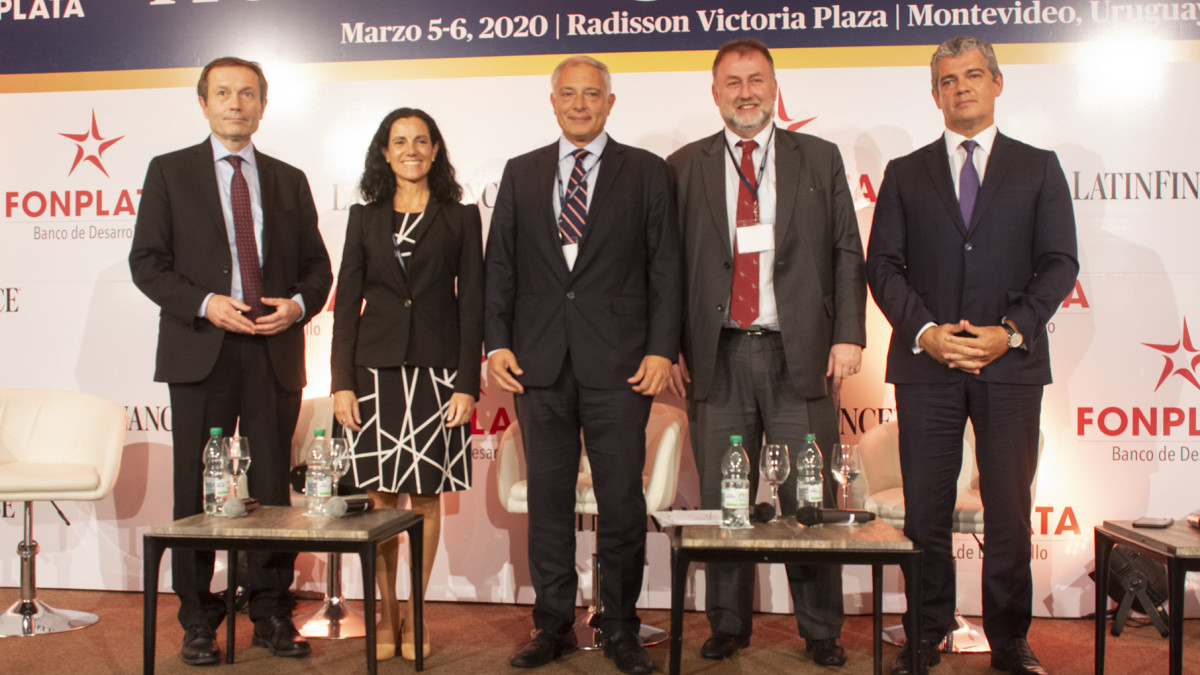FIRST INTEGRATION AND DEVELOPMENT FORUM: A COMMITMENT TO THE FUTURE
Juan E. Notaro – FONPLATA Executive President
Some days ago, we held in Montevideo the First Integration and Development Forum, which we organized together with LatinFinance. The event provided an opportunity to review the main issues related to the integration of our countries, especially within the context of the recent renewal of authorities in some of them.
The first outcome that I would like to highlight, which also satisfies me most, is that Argentina, Brazil, Paraguay, and Uruguay are still interested in moving towards integration, as stated by the authorities and representatives of these countries during the Forum.
The second is that it is clear that there is a group of institutions and professionals ready to launch initiatives and explore new ideas to consolidate integration not only physically, but also at legal and policy levels, in order to favor the flow of trade and services between these nations.
For instance, in the first day, development banks and agencies of the region stressed the importance of establishing alliances among our institutions, as well as strengthening the existing ones in order to offer efficient solutions tailored to the needs of our member countries.
In fact, FONPLATA – Development Bank has already established alliances with the IDB, MERCOSUR, CAF, the European Investment Bank, the German Development Agency and the Development Bank of Minas Gerais, the latter signed during the event in Montevideo.
The purpose of these alliances is to enhance credit capacity to fund development operations, but also to strengthen institutions, so that they can offer loans in better terms and conditions to their customers.
During the panel “Development, Challenges and Opportunities in the Southern Cone”, which I had the honor to moderate, representatives of governments of the MERCOSUR member-countries offered their perspective on how to guide public policies to strengthen productivity, employment and investment.
Participants also highlighted the coordination and joint work possibilities of this integration scheme, particularly considering the challenges posed by climate change and technological advances.
Benigno López, Minister of Finance of Paraguay, explained how his country has suffered from drought, floods and fires in the last year, a clear sign that our countries must work together towards mitigating the effects of climate change.
Marcos Troyjo, Vice Minister of Commerce and International Affairs of Brazil, referred to the need for development banks to act as bridges between manufacturing and "mind-facturing", hence education will be essential for the development of new skills.
Azucena Arbeleche, Minister of Economy and Finance of Uruguay, highlighted two issues she believes should be on the region’s work program: the need for qualified human resources to face upcoming changes, and for a follow-up on the sectors most vulnerable to these movements in favor of integration and globalization.
In similar terms, Gustavo Béliz, Secretary of Strategic Affairs of Argentina, agreed with Minister Arbeleche and added that we must work as banks, but also as development platforms, and put emphasis on overcoming the disconnection from the scientific and technological sectors.
As you can see, this is an important list of pending tasks and issues on which development banks and institutions must immediately start working together with countries and integration schemes, such as MERCOSUR.
Equally useful and productive were the other panels of the Forum, in which we discussed the social challenges for Latin America, integration and trade, and the energy infrastructure for the future.
Besides sharing our common vision for the prosperity and development of Latin America, we set out a path to follow, a joint commitment, and, most importantly, concrete lines of action to put into practice.
This First Integration and Development Forum of FONPLATA – Development Bank and LatinFinance was, without any doubt, an opportunity to renew our countries' commitment to an inclusive future, with less poverty and more opportunities.
Text originally published in the monthly column of Juan E. Notaro in the Huffington Post.
03/27/2020

